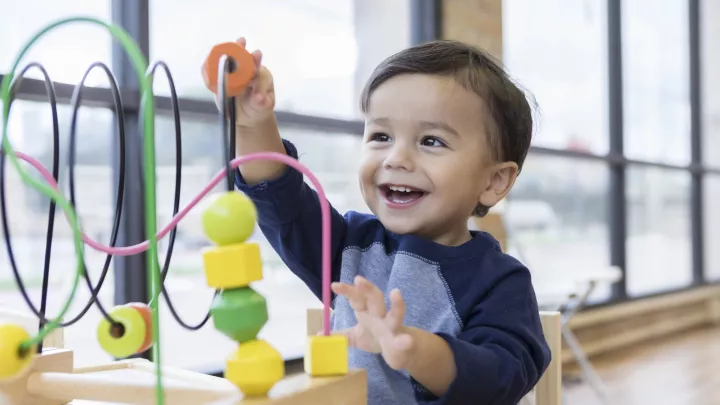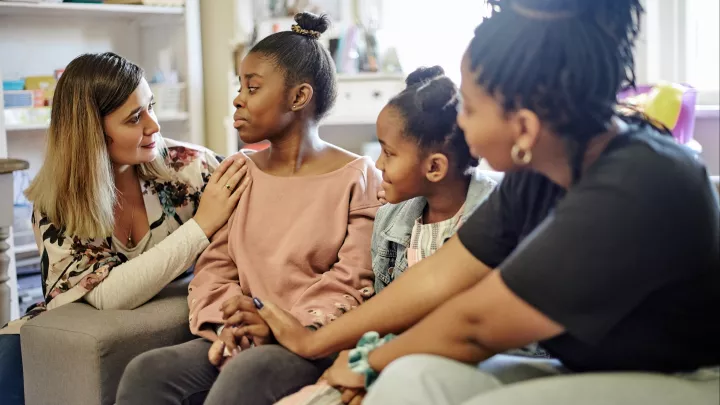Developmental-Behavioral Pediatrics
Developmental-Behavioral Pediatrics at Children’s Hospital Los Angeles addresses the medical and psychosocial aspects of children's developmental and behavioral issues. These pediatricians are crucial to diagnosing and treating complex developmental-behavioral conditions.
Recognizing that a child's well-being is deeply rooted in the family environment, our experts prioritize understanding the family's perspective. The family’s viewpoint and the impact on family life is central to our care strategy.
Developmental-Behavioral pediatricians at CHLA advocate for patients in a variety of ways, including:
- Coordinating with therapists for early intervention
- Collaborating with agencies involved in developmental care and education
- Engaging with schools to ensure educational support
This team-centered approach extends beyond our hospital walls, involving all facets of the community in supporting the child's development.
Why Choose Us
Developmental-behavioral pediatricians (DBPs) have a comprehensive background, with a Board-certification by the American Board of Pediatrics in both developmental-behavioral pediatrics and general pediatrics. DBPs are not only medical doctors but also serve as guides through the complex journey of a child's progress. They possess a unique combination of expertise to understand the full spectrum of influences on a child's development and behavior. They have advanced training and experience in the physical, emotional, behavioral, and social development of children. Their role includes:
- Assessment and diagnosis: DBPs specialize in evaluating, diagnosing, counseling and providing treatment for children, adolescents and their families with developmental disorders, learning challenges, behavioral problems, and other conditions that affect development and behavior. This includes learning disorders such as dyslexia, behavior and attention issues like attention-deficit/hyperactivity disorder (ADHD), autism spectrum disorder, intellectual disabilities, and other developmental or behavioral problems.
- Treatment planning: They develop comprehensive treatment plans that may involve medication management, behavioral therapies, and coordination with schools and other therapists to support a child's development.
- Family support and education: DBPs provide guidance and education to families, helping them understand their child's condition and how to best support their development and learning.
- Collaboration with other specialists: They often work in multidisciplinary teams with other professionals like child psychologists, speech and language therapists, occupational therapists, and educators to provide holistic care to children.
Psychologists conduct comprehensive evaluations to assess cognitive, emotional, social and behavioral aspects of a child’s development. They use a variety of standardized tests and observational methods to diagnose developmental disorders, such as autism spectrum disorders, ADHD, learning disabilities and other behavioral issues. They can also provide parent behavioral training and individual psychotherapy.
Occupational therapists are focused on evaluation, treatment and support for children with developmental and behavioral issues. They assess a child's functional abilities, including fine and gross motor skills, sensory processing, cognitive abilities and daily living skills. They use a variety of assessment tools and observations to understand a child's strengths and challenges in these areas.
Speech-language pathologists conduct comprehensive evaluations to assess speech, language, cognitive-communication, and oral/feeding/swallowing skills. They diagnose a variety of disorders, including articulation disorders, fluency disorders (like stuttering), receptive and expressive language disorders, voice disorders and social communication disorders.
Research
Researchers contribute significantly to the advancement of pediatric behavioral health care. Their work often involves clinical trials, epidemiological studies, and the development of innovative therapeutic approaches. Our faculty are involved in cutting-edge research networks such as DBPNet and ACN (Autism Care Network). Faculty present their findings in peer-reviewed publications and at national meetings such as the Society for Developmental and Behavioral Pediatrics and Pediatric Academic Society. We participate in research studies in the following areas:
- Autism Spectrum Disorder
- ADHD
- Infant-maternal interactions
- High-risk-infant follow-up
- Obesity
- Developmental disabilities
- Underserved communities
- Adverse childhood experiences
Programs and Services
Behavioral Health Institute – Wilshire
Autism and Developmental Disabilities Center
Our dedicated experts specialize in a team approach to comprehensive care and support for children with autism spectrum disorders and other developmental disabilities.
Our team includes:
- Developmental-behavioral pediatricians: Experts in identifying and treating a wide range of developmental and behavioral issues.
- Neurodevelopmental disabilities specialists: Professionals dedicated to understanding and supporting children with neurologic-based developmental concerns.
- Autism Assessment: The Boone Fetter Clinic offers comprehensive diagnoses and follow-up care for children and adolescents who have issues with neurodevelopment, behavior, attention, sensory processing, feeding difficulties and social-emotional development. Depending on what perspectives are needed, developmental-behavioral pediatricians, psychologists, speech/language pathologists, occupational therapists and more work together to deliver services in a single setting. This team approach ensures that every aspect of your child's development is understood and supported.
Community Behavioral Health Program
The Community Behavioral Health Program (DMH eligible) includes:
- Early childhood clinic in behavior in babies (ages 0 to 3)
- Early childhood assessment (ages 3 to 5)
- School-Age Clinic (5- to 18-year medication assessments)
- Feeding Clinic for behavioral and organic feeding problem consultation
Sunset Campus
Newborn Follow-Up Program
The Newborn Follow-Up Program in the hospital’s Fetal and Neonatal Institute provides ongoing developmental, behavioral and growth assessment and follow-up. They serve infants at high risk for growth and developmental issues due to conditions in the newborn period that required care in a neonatal intensive care unit. The program includes psychologists, social workers, occupational and physical therapists, and pediatric specialists.
Audrey Hepburn CARES Center
The Audrey Hepburn CARES Center provides services for suspected victims of child maltreatment and their families.
AltaMed
Developmental-Behavioral Pediatrics provides education and consultation at AltaMed, a Federally Qualified Health Center. Our physicians provide comprehensive diagnostic and treatment services that begin at birth and continue throughout childhood and adolescence.
Training and Internships
Developmental-Behavioral Pediatrics Fellowship
The Developmental-Behavioral Pediatrics Fellowship is a three-year, ACGME-accredited academic training program that has earned grant funding through the Maternal and Child Health Bureau.
California Leadership Education in Neurodevelopmental and Related Disabilities (CA-LEND) Fellowship Program
We have been training leaders, educating community providers, conducting research and promoting systemic change for children with or at risk for neurodevelopmental disabilities, including those with autism spectrum disorders. Our goal is to create an interdisciplinary learning community where leaders in maternal and child health, especially in California, prepare to serve these children and their families. We aim to do this with a life-course perspective, through patient- and family-centered, culturally responsive, coordinated, comprehensive and developmentally appropriate clinical care, teaching, research and systems change.
Learn more about the CA-LEND Program.
Pediatric Residency Program
Pediatric residents at Children’s Hospital Los Angeles benefit from exceptional training by our developmental-behavioral pediatricians in a nationally ranked hospital setting.


